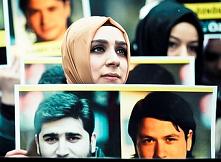
Download It's been a deadly year for journalists covering political upheaval around the world.
The latest report from the Committee to Protect Journalists shows more political reporters than war correspondents were killed in 2012.
67 journalists have lost their lives in the line of duty, so far this year, including 28 in Syria. The vast majority were local reporters and camera operators, only six per-cent were foreigners.
Sally Sara from Radio Australia talks to Joel Simon, Executive Director of the Committee to Protect Journalists.
“The reality is that most journalists who are killed around the world year after year, it's 85 - 90 per cent are local journalists who are killed in their own country. They're covering politics, they're covering human rights, they're covering corruption and they're targeted for murder by people within that society who don't want their activities exposed.”
So from your figures it's almost showing that being a political journalist is more dangerous than being a war correspondent.
“It's absolutely the case. That's in no way to minimise the threats that war correspondents face and this year in fact we've seen a huge increase in the number of journalists covering conflicts because of what's happening in Syria which has been devastating for journalists.
But year after year if you look at the long-term statistics it's journalists working in their own countries, reporting on political corruption, reporting on political scandal, reporting on human rights violations who bear the risk and bear the consequences.”
And what does your research show you about, with the best information that you have, who's responsible for those killings?
"Well it's often local political courses within the country. Sometimes they're politicians themselves who organise killings. Sometimes they're criminal organisations with ties to political groups. Sometimes they're militant groups that also operate with some sort of political protection.
And you know what else is absolutely determinative, is impunity. In country after country, if the killers of journalists are not brought to justice, then the cycle of violence in perpetuated.”
I wanted to ask you about that group because I know in other countries, in India for example, those activists who are involved in a right to information which is their equivalent of FOI - freedom of information - that's become a very dangerous task as well. Is there enough recognition of these people that provide information but are activists as well?
“There are so many groups around the world that use the gathering, the disseminating of information which is essentially a journalistic function, to advance their activist goals. And these include human right groups, environmental groups, groups agitating for greater freedom of information.
But we believe that in many cases, not all, and we look at each case very carefully, they're playing a fundamentally journalistic role. And so we classified them as journalist and we count them as journalist when they’re killed.”













